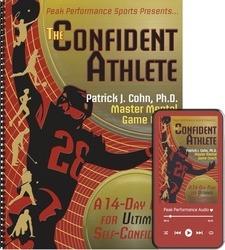In this week’s sports psychology podcast, mental game of sports expert, Dr. Patrick Cohn, answers a question from an athlete who wants to know how to best use visualization to boost confidence in sports!
Listen to this month’s sports psychology podcast to learn how to improve your performance in sports and other mental game barriers that limit your performance.
- Download the Sports Psychology Podcast #121 (right click and “save as” to your computer)
- Subscribe to The Sports Psychology podcast via iTunes.
- Grab Dr. Cohn’s free mental training and mental toughness for sports eBooks!
- Download a free sports psychology report to improve your mental game!
- Want Dr. Cohn to answer your mental game of sports question in his podcast? Submit your sports psychology question to Dr. Cohn at Peaksports.com.
Related Sports Psychology Articles
- How to Pros Use Visualization to Improve Success
- How Elite Athletes Use Visualization
- How Visualization Helps Boost Confidence
*Subscribe to The Sports Psychology Podcast on iTunes
*Subscribe to The Sports Psychology Podcast on Spotify
Download a free sports psychology report to improve your mental game!
Learn more about our one-on-one mental game coaching.
The Confident Athlete

“The Confident Athlete” consists of 2 audio programs that include 14 days of confidence fueling exercises and a simple to follow workbook that guides you through the 14 days, helps you apply the strategies, and customizes the exercises to your personal needs.
Let me help you put a stop to the confidence leak. You can learn to have greater levels of confidence in competition than you do in practice by identifying the specific ways you undermine your own confidence and how to convert your practice confidence into COMPETITIVE CONFIDENCE.
“The Confident Athlete” is a ground-breaking system to teach you how to think like a champion and have ultimate self-confidence every time you step on the playing field, court, track, or course. The confident athletes was developed for any athlete – junior to professional –that wants to gain confidence. However, coaches and sports parents can learn how to teach others to perform with ultimate confidence. Use my program if you want to bust a slump or just wanting higher or more consistent levels of self-confidence.

Hello Dr. Cohn,
I certainly realize that we should’ve addressed this MONTHS ago. My husband will be doing his first Ironman Triathlon in less than 2 weeks. At this late point in time, what 2 or 3 things would you advise him to do, to give him a psychological edge?
Thank you kindly for any input,
Birgit Dommen
Mental training is not about a quick fix for competition. We look at mental training as a long term process of education to help athletes improve their understanding of the important mental skills for competition.